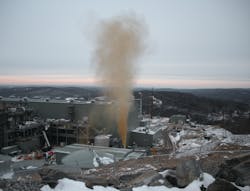NFPA Urges New Safety Rules in Wake of Fatal Conn. Blast
National Fire Protection Association President James M. Shannon announced the proposal Tuesday at a press conference in Town Hall.
Six people were killed and nearly 50 injured on Feb. 7, 2010 after an explosion at the under-construction Kleen Energy plant that occurred during a pipe-cleaning procedure, called a "gas blow," in which natural gas was pumped through pipes to clean out debris. The gas was vented into a closed courtyard behind the main building, where it built up until an undetermined ignition source sparked the explosion.
"There really was no standard that governed the Kleen Energy disaster," Shannon said. "Normally, the process of issuing new standards takes up to three years, but we fast-tracked this to hopefully prevent this from happening again."
Officials cautioned that the new standard is not a federal law. Congress must pass it into law or the federal Occupational Safety and Health Administration would have to adopt the plan. States can also pass their own laws prohibiting the practice. Currently, Connecticut is the only state that bans the use of natural gas to purge pipes at power plants.
U.S. Chemical Safety Board Chairman Rafael Moure-Eraso said the new standard is needed because there are more than 125 gas-powered plants currently being built across the country.
"This new standard sends a clear message that natural gas is inherently dangerous when it comes to gas blows," Moure-Eraso said. "We are urging federal OSHA and states and localities to adopt this standard as Connecticut has already done."
The six men killed in the Kleen Energy blast were Raymond Dobratz, 58, Peter Chepulis, 48, Ronald J. Crabb, 42, Chris Walters, 48, Roy Rushton, 36, and Kenneth Haskell, 37.
U.S. Rep. Rosa DeLauro, D-3, who was credited by federal officials for pushing hard for the new standards, said Kleen Energy was not the first natural gas explosion during a purge.
"The six men who died last February did not die in vain and hopefully this tragedy in Middletown will be the last of its kind," DeLauro said.
Federal regulators issued more than $16 million in fines and identified more than 100 safety violations at the plant after the blast. O&G Industries of Torrington, the general contractor and minority owner of the $1 billion facility, has denied any wrongdoing.
Middletown Mayor Sebastian Guliano said that the criminal investigation into the blast is not over and police have collected and stored evidenced removed from the site. But sources said that there were so many potential ignition sources it was impossible to pinpoint the exact source and also difficult to determine who was actually in charge of the purge that day.
"Most people know this was a gas purge that went awry but what they might not know is that eight days earlier they did a textbook purge," Guliano said. "The difference between a successful purge and a disaster is paper thin."
A rebuilt Kleen Energy plant opened for business during the summer. Guliano said "in terms of safety there haven' t been any issues with them."
Copyright 2011 - The Hartford Courant, Conn.
McClatchy-Tribune News Service
